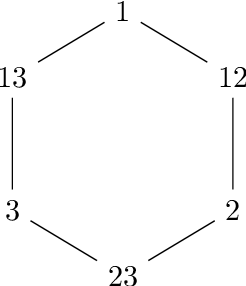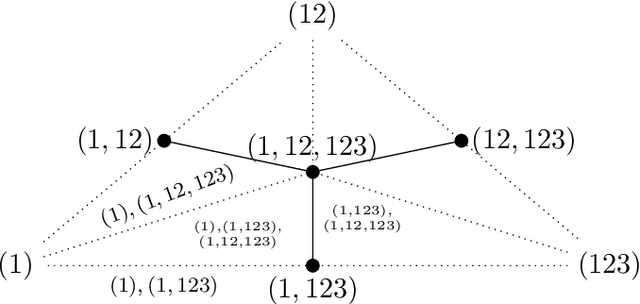Bogdan Chornomaz
Spherical dimension
Mar 13, 2025Abstract:We introduce and study the spherical dimension, a natural topological relaxation of the VC dimension that unifies several results in learning theory where topology plays a key role in the proofs. The spherical dimension is defined by extending the set of realizable datasets (used to define the VC dimension) to the continuous space of realizable distributions. In this space, a shattered set of size d (in the VC sense) is completed into a continuous object, specifically a d-dimensional sphere of realizable distributions. The spherical dimension is then defined as the dimension of the largest sphere in this space. Thus, the spherical dimension is at least the VC dimension. The spherical dimension serves as a common foundation for leveraging the Borsuk-Ulam theorem and related topological tools. We demonstrate the utility of the spherical dimension in diverse applications, including disambiguations of partial concept classes, reductions from classification to stochastic convex optimization, stability and replicability, and sample compression schemes. Perhaps surprisingly, we show that the open question posed by Alon, Hanneke, Holzman, and Moran (FOCS 2021) of whether there exist non-trivial disambiguations for halfspaces with margin is equivalent to the basic open question of whether the VC and spherical dimensions are finite together.
On Reductions and Representations of Learning Problems in Euclidean Spaces
Nov 16, 2024Abstract:Many practical prediction algorithms represent inputs in Euclidean space and replace the discrete 0/1 classification loss with a real-valued surrogate loss, effectively reducing classification tasks to stochastic optimization. In this paper, we investigate the expressivity of such reductions in terms of key resources, including dimension and the role of randomness. We establish bounds on the minimum Euclidean dimension $D$ needed to reduce a concept class with VC dimension $d$ to a Stochastic Convex Optimization (SCO) problem in $\mathbb{R}^D$, formally addressing the intuitive interpretation of the VC dimension as the number of parameters needed to learn the class. To achieve this, we develop a generalization of the Borsuk-Ulam Theorem that combines the classical topological approach with convexity considerations. Perhaps surprisingly, we show that, in some cases, the number of parameters $D$ must be exponentially larger than the VC dimension $d$, even if the reduction is only slightly non-trivial. We also present natural classification tasks that can be represented in much smaller dimensions by leveraging randomness, as seen in techniques like random initialization. This result resolves an open question posed by Kamath, Montasser, and Srebro (COLT 2020). Our findings introduce new variants of \emph{dimension complexity} (also known as \emph{sign-rank}), a well-studied parameter in learning and complexity theory. Specifically, we define an approximate version of sign-rank and another variant that captures the minimum dimension required for a reduction to SCO. We also propose several open questions and directions for future research.
Dual VC Dimension Obstructs Sample Compression by Embeddings
May 27, 2024



Abstract:This work studies embedding of arbitrary VC classes in well-behaved VC classes, focusing particularly on extremal classes. Our main result expresses an impossibility: such embeddings necessarily require a significant increase in dimension. In particular, we prove that for every $d$ there is a class with VC dimension $d$ that cannot be embedded in any extremal class of VC dimension smaller than exponential in $d$. In addition to its independent interest, this result has an important implication in learning theory, as it reveals a fundamental limitation of one of the most extensively studied approaches to tackling the long-standing sample compression conjecture. Concretely, the approach proposed by Floyd and Warmuth entails embedding any given VC class into an extremal class of a comparable dimension, and then applying an optimal sample compression scheme for extremal classes. However, our results imply that this strategy would in some cases result in a sample compression scheme at least exponentially larger than what is predicted by the sample compression conjecture. The above implications follow from a general result we prove: any extremal class with VC dimension $d$ has dual VC dimension at most $2d+1$. This bound is exponentially smaller than the classical bound $2^{d+1}-1$ of Assouad, which applies to general concept classes (and is known to be unimprovable for some classes). We in fact prove a stronger result, establishing that $2d+1$ upper bounds the dual Radon number of extremal classes. This theorem represents an abstraction of the classical Radon theorem for convex sets, extending its applicability to a wider combinatorial framework, without relying on the specifics of Euclidean convexity. The proof utilizes the topological method and is primarily based on variants of the Topological Radon Theorem.
Local Borsuk-Ulam, Stability, and Replicability
Nov 02, 2023

Abstract:We use and adapt the Borsuk-Ulam Theorem from topology to derive limitations on list-replicable and globally stable learning algorithms. We further demonstrate the applicability of our methods in combinatorics and topology. We show that, besides trivial cases, both list-replicable and globally stable learning are impossible in the agnostic PAC setting. This is in contrast with the realizable case where it is known that any class with a finite Littlestone dimension can be learned by such algorithms. In the realizable PAC setting, we sharpen previous impossibility results and broaden their scope. Specifically, we establish optimal bounds for list replicability and global stability numbers in finite classes. This provides an exponential improvement over previous works and implies an exponential separation from the Littlestone dimension. We further introduce lower bounds for weak learners, i.e., learners that are only marginally better than random guessing. Lower bounds from previous works apply only to stronger learners. To offer a broader and more comprehensive view of our topological approach, we prove a local variant of the Borsuk-Ulam theorem in topology and a result in combinatorics concerning Kneser colorings. In combinatorics, we prove that if $c$ is a coloring of all non-empty subsets of $[n]$ such that disjoint sets have different colors, then there is a chain of subsets that receives at least $1+ \lfloor n/2\rfloor$ colors (this bound is sharp). In topology, we prove e.g. that for any open antipodal-free cover of the $d$-dimensional sphere, there is a point $x$ that belongs to at least $t=\lceil\frac{d+3}{2}\rceil$ sets.
 Add to Chrome
Add to Chrome Add to Firefox
Add to Firefox Add to Edge
Add to Edge